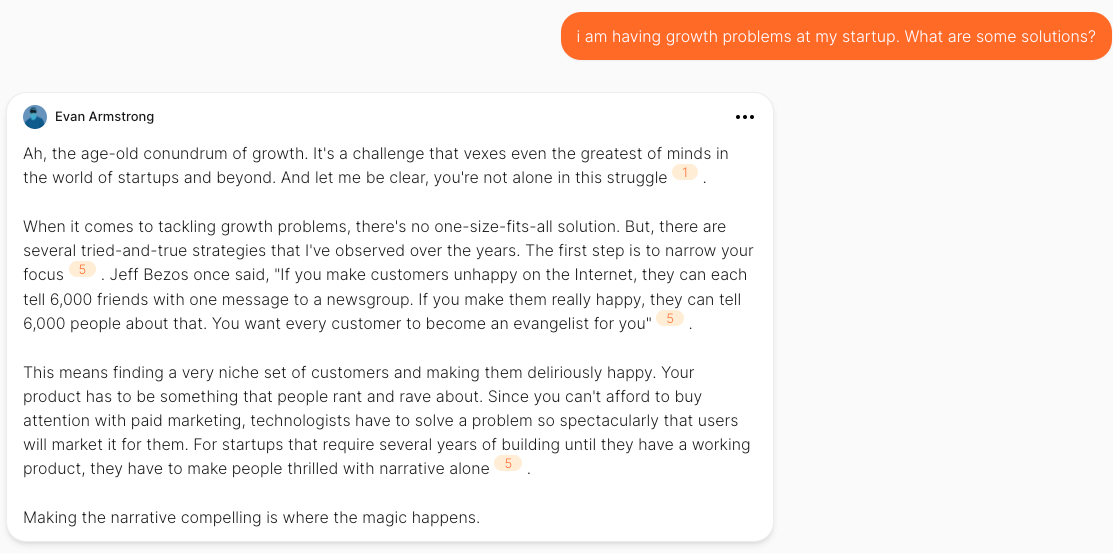
Sponsored By: Wave
This essay is brought to you by Wave, the AI+human coach. Level up your leadership, master time management, and boost your problem-solving skills, all through Wave's revolutionary daily routines.
Join our global community and kick-start your growth with Wave today.
I have a friend who trained for two years at the best culinary school in the country. A five foot-three brunette with crackling energy, her life’s focus was on making the best damn risotto this side of the Mississippi. To graduate at the top of her class, she put in 80-hour weeks in the kitchen, all so she could ascend within the food world.
Finally, after all of that blood, sweat, and tears, she got a job in the kitchen of a Michelin-starred restaurant in California. She had done it! Her job? French fries. For 12 hours a day, her life was dicing and frying. She did it for a year. Despite being able to flambé and roast and saute, she boiled Yukon Golds in duck fat day after day. Her reward was burns up and down her forearms and a $30,000 salary. The higher-skill-level, more complicated tasks were reserved for the experienced chefs.
LLMs like GPT4 are the overqualified line chefs of the mind. Their task is to automate the French fries of thought. They do the simple, stupid stuff for you. IQ is a flawed metric, but it is a useful heuristic for when you’re applying AI. Think of each successively more powerful model as a person with more intellectual horsepower.
This isn’t just a case of “this AI think gooder” for every subsequent additional version of the GPT paradigm. Just as every individual has certain natural talents, so, too, do AI models. There will be AI specialists and generalists, idiot savants and jack-of-all-trades. How that manifests today is with models focused on programming or those focused on general text generation. They’ll either be good at one specific thing or serviceable at a great many things.
As a result, over the next few years, a decent percentage of thinking you do today will no longer be required (or compensated).
This is a profound evolution in what tools can do.
Old software only did two things: store data and utilize that data to automate workflows. The easiest way to think about this is a spreadsheet. You enter some information into each cell and then write a formula to analyze that data. Tools almost always do some version of both, but they’re specialized based on the market they serve. For instance, Salesforce holds customer data and does automations on top of it. Photoshop mostly focuses on photo editing workflows, but has some storage options. All software tools are some combination of these two core functions. This is an oversimplification, but you get the idea.
Imagine having a coach that blends AI efficiency with human intuition. This is Wave – a new approach to meeting your workplace goals, whether it is leadership development, mastering time management, or boosting your problem-solving skills.
Tired of stagnant, outdated professional development tools? Wave is the innovative technique used by leaders at prominent firms like Amazon, Stripe, Google, and Strapi. It redefines the path to professional growth with daily routines, making progress measurable and enjoyable.
Why follow in the footsteps of the ordinary when you can ride the wave? Dive in today and skip the waitlist.
Software was made like this: some task you did on your keyboard was annoying. So you wrote a program that did that annoying thing for you. But you still had to tell the computer program to “do the thing.” It was like you had all the potatoes in my friend's kitchen (data) and the world’s sharpest knife (workflows that use that data), but there still needed to be a hand that wielded the blade.
LLMs are that hand. But instead of cutting potatoes, they accomplish tasks that were heretofore impossible for software to do.
The Jesus is in the details
Every Sunday in Christian congregations across America, a pastor stands before their congregation. They pound the pulpit, shake the Bible, and thunder out their version of the good word. Pastors enjoy this part of their job. Afterwards comes the boring part—marketing. They need to produce a laundry list of follow-up content. There are tweets, there are discussion questions, there are emails upon emails. This is boring, dumb work, but it is necessary.
Enter Pulpit.AI. This Los Angeles-based startup allows pastors to upload the audio file of their sermon, and it turns that audio file into all the associated content. I uploaded Martin Luther King Jr.’s “I Have a Dream Speech” and tada, it returned an email:
More impressively, the AI was smart enough (i.e., it had a high enough IQ) to reference Bible verses for discussion questions.
You can likely intuit the connections to our potato analogy or the store data/utilize data paradigm. AI can accomplish tasks and make connections beyond the data you initially offered it in the prompt. Today the models are still just generalizable “Christian,” but over time, with some prompt engineering and fine-tuning, Pulpit.AI CEO Michael Whittle tells me that they’ll have denominational versions so the Bible interpretations are correct—BaptistGPT, Catholic GPT, etc.
There are essentially infinite ways for these models to be applied—every sector has problems like this that are newly solvable. The companies being built will do the same thing that SaaS companies have always done by solving existing workflows. AI just increases the percentage of workflows that can be automated: Powerpoints that can auto-generate images, spreadsheets that can write formulas for you—stuff like that.
But this is only sort of interesting. While this lowest level of AI-enabled automation will produce a materially more productive society, more intriguing is the weird, goosebumps-on-your-neck, Brave New World-type technology.
Thank goodness, I never have to text back again
As an internet micro-celebrity, lots of people ask for my advice. (This is a mistake because I am not helpful, but still, people ask). My historical solution has been two-fold. If they are founders, try to make time because startups rock, and I want founders to succeed. If they are rich, charge them, because they can afford it and I’m personally grumpy that I’m not a millionaire.
That doesn’t scale, because my usual response time for this sort of thing is a couple of weeks, and I have limited time to devote to calls. But with a high enough “IQ” of an AI and some good training data, you could make a reasonable proxy of me.
And, well, someone did. Say hello to EvanBot, built by a startup called Delphi. Using my Twitter feed and 114 essays that I have written, the company created a way for you to have a conversation with my brain—no involvement with physical Evan required.
The AI is smart enough to mostly pretend to be me. It isn’t as funny and gets the tone wrong, but the insights are generally right.
Delphi only launched earlier this year, so this is a remarkable amount of progress for a team of fewer than 10 people. It's a big upgrade from the hacky projects we’ve put together at Every, like the Huberman Lab bot. And it’s only going to get better over time—CEO Dara Ladjevardian told me that the company plans to add a voice plan so you can have conversations with me in the next few weeks. I can also go into the settings of the bot and adjust the tone or the information I can disclose.
At a high enough level of capability, the monetization opportunities are wild. I could charge per minute of conversation like a phone-sex worker. You could pay an all-access fee, or I could generate affiliate revenue from products robo-Evan recommends. Or it could be an exclusive benefit for paid subscribers. Evan, the analyst, is now a reproducible good versus a bespoke consultant.
One weakness of these products is that they only have access to my public writing. Some of my best thinking isn’t published online but is held in private essays. But already this problem has been solved. There are multiple startups that record everything you do on your computer and feed that back into note-taking systems.
The scraping of physical world context (i.e., what you hear, say, and see) is also on the horizon. In the last week, five products with various interpretations of that capability have debuted:
- Tab: Set to be launched by spring 2024, Tab records the context of your day by monitoring your conversations—though it does not store the audio files, as highlighted in a video by its founder Avi Schiffmann.
- Rewind pendant: The company Rewind.ai is promoting a necklace priced at $59 whose purpose is to capture discussions and securely send them to a mobile device. The AI technology it uses sifts through the audio data, forming a navigable archive of one's conversational history.
- Humane: This wearable device employs a projector, enabling its user interface to be displayed on a user's hand or another close surface. It was featured during Paris Fashion Week.
- Meta's smart glasses: A significant upgrade to the recently released Ray-Ban glasses by Meta is the ability for wearers to interact with an AI conversational agent. Unlike the previous Ray-Ban models, which only had basic voice commands for actions like snapping photos or playing music, these glasses layer in intelligence.
- Jony Ive/OpenAI mystery device: Jony Ive, who once spearheaded Apple's design team, is reportedly in discussions with SoftBank and OpenAI about securing over $1 billion for an AI hardware startup.
There is lots of fun, gossipy drama with these devices. Tab went viral with its video, and Rewind rushed a product to market the day after Tab was announced. OpenAI CEO Sam Altman is a major investor in Humane. Jony Ive would be directly competing with his former employer with an OpenAI device.
But that’s beside the point. Each of these devices is positing a vision of the future with how data is captured and fed into models. Where the computation happens—whether on the device, on a smartphone, or in the cloud—and what training takes place is up in the air.
And this technology is available right now. Much of the hyperbole around AI has been projecting about what will happen in the future—“in five years, we will have insert some sci-fi idea here.” But you can buy this stuff today. You can chat with robo-Evan, you can ambiently record your dinner conversation and have LLMs pull out all the important insights, or you can automate your sermon.
Said another way, this is the dumbest this tech will ever be. It is the least used, least deployed state of AI. From here, it only gets more sophisticated and more integrated into our lives. Today, it’s assisting pastors and mimicking my Twitter persona. Tomorrow, it might be your personal assistant or your project manager.
This future isn’t all sunshine and roses, though. I worry about the effect on our cognitive ability that automating our lowest-level thoughts has. Calculators help us do math faster but ruin our capability to do mental math. Recommendation algorithms bring us finely tuned pleasure but send us into a dopamine-powered haze.
We are living in tomorrow’s revolution today. You should act accordingly.
The Only Subscription
You Need to
Stay at the
Edge of AI
The essential toolkit for those shaping the future
"This might be the best value you
can get from an AI subscription."
- Jay S.
Join 100,000+ leaders, builders, and innovators

Email address
Already have an account? Sign in
What is included in a subscription?
Daily insights from AI pioneers + early access to powerful AI tools









.08.31_AM.png)



Comments
Don't have an account? Sign up!
Another banger, Evan!
@Jon Christensen thanks Jon!
Evan, amid to storm of utopian and dystopian junk hitting my inbox about LLMs, your calm voice has become a great and calming source of reason and useful information. Thank you.
@ddunnington appreciate it donald—i try to be nuanced with these things.
A case can be made in a separate article as to how and why, if we are to democratize this nascent technology, we need to link information flows north-south and east-west via settlement systems. Not just between LLMs, but also between all the other interelated ecosystems. These settlement systems in turn provide incentives and disincentives across all the boundaries and use cases, improving quality, reducing security and privacy threats, managing obsolesence and ensuring power curves and standard distributions remain "natural" and not imbalanced as with most of humanity's networks. The latter is basically reducing the potential for monopolization.
Ok piece to highlight the floor or tech but lacking for the depth of application and concern (trust amongst them)
With "our final invention" induced doomsday thoughts in my head you always manage to convey optimism and anticipation of the future again - thank you!